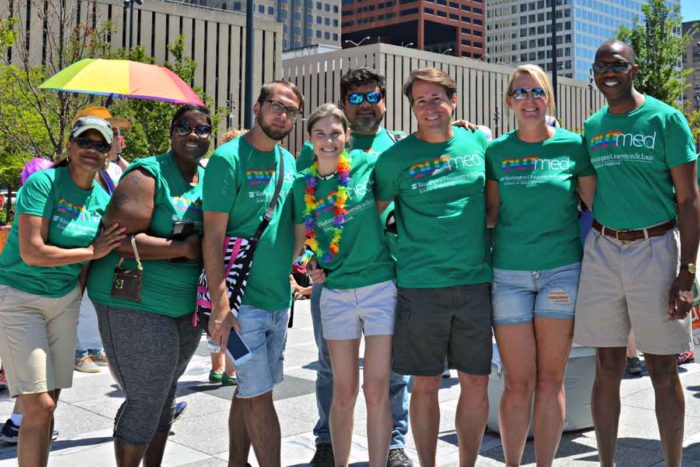New group supports LGBTQ community at medical school
Group focusing on networking, mentorship, education, patient care
 Virginia Kelly
Virginia KellyMembers and supporters of the Department of Medicine’s OUTmed group marched in this year’s St. Louis PrideFest parade June 25. Attendees included faculty and staff members (left to right): Arlene Moore Ross, Kia Holmes, Adam Jones, Kara Sternhell-Blackwell, Joe Pangelinan, Chris Adkins, Traci Albers and Will Ross. OUTmed formed to support LGBTQ-identified faculty, residents, fellows and staff at the School of Medicine.
The realization that it can be difficult for LGBTQ faculty, staff and students to connect, develop networking relationships and find mentors helped lead to the creation of OUTmed at the School of Medicine.
Recently launched by the Washington University’s Department of Medicine, OUTmed aims to support LGBTQ-identified faculty, residents, fellows and staff in the department and the school as a whole.
“It is important to be supportive and to develop new programs and initiatives that provide education for our employees, trainees, faculty and patients to promote tolerance, inclusion and equal rights for everyone,” said Victoria J. Fraser, MD, the Adolphus Busch Professor and head of the Department of Medicine. “We also need to develop specific centers of excellence and medical curriculum to ensure optimal health-care delivery for the LGBTQ community to reduce health disparities and improve health-care outcomes.”
With that and more in mind, the group’s work is underway.
Led by Kara Sternhell-Blackwell, MD, an assistant professor of dermatology, OUTmed had its first advisory board meeting in the spring. Among the organization’s first activities was preparing for PrideFest, the St. Louis area’s annual LGBTQ community advocacy event and parade in June. The department was a corporate sponsor of this year’s PrideFest and supplied a supportive contingent of marchers for the parade.
Among the group’s other initial priorities was to create – with collaboration from LGBTQ Med, a student-run group – a listing of School of Medicine faculty, staff, residents, fellows, and graduate and medical students who identify as members of the LGBTQ community, and a list of LGBTQ community allies.
“One of the things that we became aware of was that it’s not always easy for LGBTQ faculty, staff and students to find each other,” said Sternhell-Blackwell. “By creating a visible organization and these lists, we hope to allow people to find each other and develop networking and mentoring relationships.”
Sternhell-Blackwell also is promoting the collection of patients’ sexual orientation and gender-identity information, known as SOGI data. Giving patients the option to include such information on their health forms can help patients, while also helping health-care experts to better understand and decrease health disparities for LGBTQ patients.
“We’re trying to bring national best practices in LGBTQ health care here to WashU,” said Sternhell-Blackwell, who is introducing the new questionnaires in the dermatology clinic where she works.
“If you know who you have in your community, then it’s easier to identify their needs,” added Joe Pangelinan, PhD, who heads the Department of Medicine’s Office of Inclusion and Diversity. Opportunities to include SOGI data were added to the department’s employee survey this year.
Sternhell-Blackwell said other ways to improve patient care include adding training for clinicians and staff on LGBTQ health issues; making the schools’ and hospitals’ physical spaces more LGBTQ-inclusive (for example, providing information about gender-neutral bathrooms); and creating directories and websites that make it easier for LGBTQ patients to find services they need.
The training portion is also a priority for Pangelinan, who is working on a “train-the-trainer” pilot program to help deepen trainers’ knowledge in specific areas of diversity and inclusion, including issues in the LGBTQ community.
To enhance medical education, second-year MD/PhD candidate Patrick DeSouza is leading a push to design a course aimed at increasing students’ understanding of how LGBTQ health disparities arise.
“As one of the LGBTQ Med leaders, it’s important to me that LGBTQ+ health is sufficiently addressed during the entirety of medical school education, to help the fight for equal access to health care, especially focusing on the disparity that exists.”
The response to these initiatives has been positive and enthusiastic so far, said Sternhell-Blackwell. “Everyone, from residents to staff to faculty to students, has been interested in participating and excited to give time and energy and be involved in different parts of the efforts.”
Added Fraser: “It is essential for the success of our institution to be fully inclusive, to recognize and celebrate our diversity and to ensure that everyone feels comfortable being who they really are.”






